Crypto Exchange Binance and Social Media X Blocked in Venezuela
12.08.2024 16:08 1 min. read Alexander Stefanov
The Venezuelan government has recently imposed restrictions on several online platforms, including the cryptocurrency exchange Binance and the social media network X, amid political unrest following the recent presidential election.
According to the anti-censorship group VE sin Filtro, a DNS block has disrupted access to Binance, impacting both its website and mobile app.
Binance confirmed the issue and reassured users that their funds remain secure while it works to resolve the situation. This comes a day after Venezuelan President Nicolas Maduro announced a ten-day ban on X, following tensions with the platform’s owner, Elon Musk.
The encrypted messaging app Signal also faced access issues, though it remains available through circumvention tools.
Protests erupted after the July 28 election, where both Maduro and challenger Edmundo González claimed victory. The official count declared Maduro the winner with just over 51% of the vote, while González contended that he had secured nearly 70%.
The international community, including the U.S., EU, and several South American nations, has questioned the legitimacy of Maduro’s win, demanding a full vote count.
-
1
USA Imposes Tariffs on Multiple Countries: How the Crypto Market Could React
08.07.2025 8:30 2 min. read -
2
UAE Regulators Dismiss Toncoin Residency Rumors
07.07.2025 11:12 2 min. read -
3
Ripple Selects BNY Mellon as Custodian for RLUSD Stablecoin Reserves
09.07.2025 15:28 2 min. read -
4
Majority of U.S. Crypto Investors Back Trump’s Crypto Policy, Survey Finds
05.07.2025 18:09 2 min. read -
5
Robinhood Launches Ethereum and Solana Staking for U.S. Users
11.07.2025 14:30 2 min. read
4 Key Developments That Could Shake the Crypto Market This Week
The final week of July is shaping up to be a pivotal one for global markets, with multiple high-impact U.S. economic events lined up that could trigger volatility across stocks, bonds, and crypto assets.
Why Most Americans Still Avoid Crypto Despite Growing Adoption
Cryptocurrency ownership in the U.S. has grown steadily over the past few years, but it remains far from widespread.
Two Upcoming Decisions Could Shake Crypto Markets This Week
The final days of July could bring critical developments that reshape investor sentiment and influence the next leg of the crypto market’s trend.
Winklevoss Slams JPMorgan for Blocking Gemini’s Banking Access
Tyler Winklevoss, co-founder of crypto exchange Gemini, has accused JPMorgan of retaliating against the platform by freezing its effort to restore banking services.
-
1
USA Imposes Tariffs on Multiple Countries: How the Crypto Market Could React
08.07.2025 8:30 2 min. read -
2
UAE Regulators Dismiss Toncoin Residency Rumors
07.07.2025 11:12 2 min. read -
3
Ripple Selects BNY Mellon as Custodian for RLUSD Stablecoin Reserves
09.07.2025 15:28 2 min. read -
4
Majority of U.S. Crypto Investors Back Trump’s Crypto Policy, Survey Finds
05.07.2025 18:09 2 min. read -
5
Robinhood Launches Ethereum and Solana Staking for U.S. Users
11.07.2025 14:30 2 min. read


